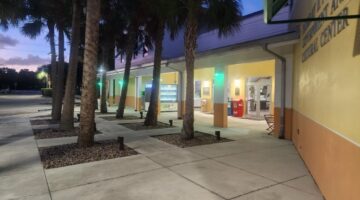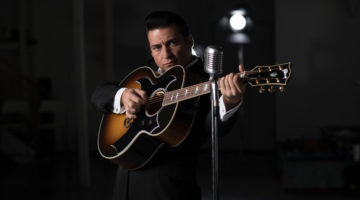A Thanks to the Conchs from Peter Anderson
Chapter 12
This week, Secretary General of the Conch Republic Sir Peter Anderson wants to take a special moment in the series to thank the Conchs of Key West who have welcomed all of the rest of us to their island. Their remarkable generosity of spirit, their unique sense of humor that finds delight in diversity and their irascible defense of old-fashioned pride have created this paradise for us all to enjoy.
Says Anderson: “Thanks, Conchs, you are a unique and special people and I am proud to be here.”
But Anderson wants want to go a little further, actually a lot further, in explaining his appreciation of some of the most, if not the most wonderful people on earth.
Anderson fell in love with the Conch people when he moved here 30 years ago. One of the things that struck him the most was the level of old-fashioned civility that he found here. People could fight about politics or business or anything else, but everybody sat down and ate and drank as friends. None of the “business” of life had any place around the table, in the backyard or on the front porch.
Civility. What a wonderful and sadly out-of-date term. Anderson claims that nowadays we take our prejudices and hates to bed with us — and we are the poorer for it.
It was some years after he moved to Key that he first learned about Green Turtle Cay. Those here with names like Bethel and Pinder and Lowe and Russell and Saunders and Roberts and Curry (to name but a few) are all native sons and daughters of Green Turtle.
He discovered a book called “Wind from the Carolinas” about Loyalists to the British Crown who fled the American Revolution in the face of extreme duress. Wives and daughters despoiled, fortunes and lands confiscated, lives ruined by loyalty. Anderson offers some of their history:
“Many of these folks fled to the Northern Bahamas, particularly to the Abaco Island area, where they established pineapple plantations on the Great Abaco and little towns and villages on the islands off the windward side of the Sea of Abaco. These little islands were hilly compared to the flat, swampy lands of Great Abaco and they were blessed by sea breezes fresh from Africa to cool and refresh the occupants.
“Primary among these communities was New Plymouth on Green Turtle Cay, a thriving town that grew up around a storybook harbor. Large homes in the Victorian style were built along New Parliament Street, homes to planters and sea captains and merchants galore.
“In the early 1800s, the market for pineapples shifted due the changing demands of the marketplaces in Europe and America, and the driving force of the Abaconian economy disappeared.
“But word went out about a little island to the west being settled by kindred souls called Key West. As Abaconians sailed there, they discovered that a lot of ships wrecked along the reef tracks of the Florida Keys with rich cargos for the taking. Add the fact that fish and turtles practically jumped into the boats, and that land was cheap and available, many people from New Plymouth began to emigrate to the new town of Key West.
“Houses came down board and nail and were loaded aboard ships, brought here and reconstructed. As all shipping headed either to or from Europe to the American Gulf Coast had to sail past Key West, it soon became a thriving port, the only deep-water port in the Keys.
“Many of the family names associated with the founding history of this island are names from Green Turtle. Key West became the second richest city in America.”
Peter Anderson discovered Green Turtle Cay as a member of Reef Relief’s board of directors and an old friend of Craig and Deevon Quirolo who founded the organization. Anderson and Quirolo sailed to Green Turtle aboard the “Magic Dragon,” dragging a Carolina skiff through a dark and stormy Gulf Stream night. Upon arriving, Anderson was introduced to the Captain Roland Roberts House in New Plymouth. The historic preservation folks had convinced the Roberts family to donate the house and had set about to restore it to its former glory as one of the last of the Great Houses still standing. Once restoration was done, the family decided its highest and best use was as an environmental education center and so they chartered Reef Relief to lease the house and create a center.
When Anderson first stood in the main room of the house he noticed an anomaly in the flooring of the room. Several spots in the flooring were the end grain of what had been posts embedded in the floor, describing a rectangle in the room. Asking about these, he was told that in the old days these were the posts that created the “birthing room” in the house.
Birthing room?
Yes, he was told. “When the mother’s time came, heavy black drapes were hung around the room and over the windows to create a darkened space. Mother and the midwives would enter this space, gently lit by candles and oil lamps to await the birth of the baby. When the baby was born, baby and mother would stay inside of this gentle, dark space for three days with the midwives in attendance on their every need. Only after three days of this quiet life would the baby be taken out into harsh light of day.”
Suddenly everything became clear. In a flash, Anderson understood what made these people so magical and kind. They came from a tradition of being gentled onto this earth and into this life in a quiet and loving space.
Up through at least the last generations of Conchs born after World War II, a similar tradition held in Key West in which the mother and baby enjoyed a period of time referred to as “confinement” or “lying in,” once again reinforcing the idea of gentling life into this world.
This coupled with the old-fashioned notion of good manners (often instilled into the child with some amount of “insistence”) created a very civil and civilized society. It was this society that Anderson fell in love with 30 years ago and it is this society that has welcomed good and interesting people with the diversity they have represented for generations.
So Secretary General Anderson asks us to stop for a moment and say “good day” and inquire about a person’s wellbeing before demanding service or asking a question. Defer to others instead of insisting on your own way. Remember that you are not the only person on earth when sharing the road or the sidewalks. Judge not lest ye be judged when regarding others. And have care about the quality of the wake you leave as you move through this life.
Anderson says that we reward the gift that the Conchs share with us when we do. Remember, “Appreciation burnishes the gift.” Show your appreciation every day in every way. We will all be richer for it.
“Long live the Conch Spirit, long live the Conch Republic and long live each and every one of you” — with love, Sir Peter Anderson, Secretary General, Conch Republic.
Next chapter: “Black Friday in the Florida Keys.”
[livemarket market_name="KONK Life LiveMarket" limit=3 category=“” show_signup=0 show_more=0]




. . . and that, Sir Secretary General, is why you’re the KING !!